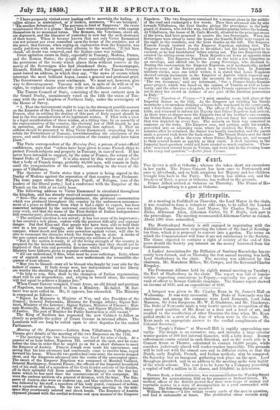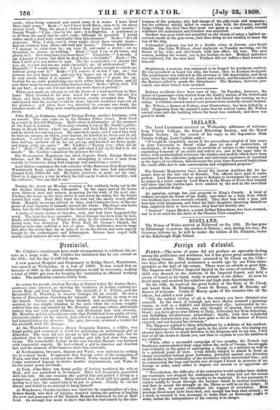Ytirtrupolio.
At a meeting in Guildhall on Thursday, the Lord Mayor in the chair, it was resolved to form a volunteer rifle corps, to be called the London Rifle Brigade. Besides the Lord Mayor, Sir Charles Napier, Lord Elcho, Alderman Allen, Alderman Carter, Sir F. Doyle took part in the proceedings. The meeting recommended Alderman Carter as colonel. About 130/. were subscribed.
The Horticultural Society is still engaged in negotiating with the Exhibition Commissioners respecting the tenure of the land at Kensing- ton Gore, which it is proposed to convert into a garden. The terms on which the Commissioners will lease it are not satisfactory to the Society. The clause objected to contains a right of reentry at the end of five years should the Society pay interest on the money borrowed from the Commissioners.
A Ladies' Association for the Diffusion of Sanitary Knowledge has re- cently been formed, and on Thursday the first annual meeting was held, Lord Shaftesbury in the chair. The meeting was addressed by the chairman, Mr. Monekton Milnes, Mr. Cowper, and the Reverend Charles, Kingsley.
The Protestant Alliance held its eighth annual meeting on Tuesday; the Earl of Shaftesbury in the chair. The report was full of lamen- tations respecting concessions to Popery,—especially the grant of the rank of officer to Roman Catholic chaplains. The finance report showed an income of 965/. and an expenditure of 8181.
A banquet was given to Mr. Charles Kean in St. James's Hall on Wednesday. It was very successful. The Duke of Newcastle was the chairman, and among the company were Lord Exmouth, Lord John Manners, Sir John Burgoyne, Mr. W. E. Gladstone, and Mr. Thackeray. The Duke of Newcastle made a very hearty speech in recognition of the many good qualities of Mr. Kean as a man and a lover of art, and recalled to the recollection of other Etonians the time when Mr. Kean pulled stroke in a crew of six, four of whom were in the room. Mr. Kean made an appropriate answer to the cordial compliments of the Colonial Secretary.
The "People's Palace" at Mu.swell Hill is rapidly approaching ma- turity. The design is an extensive one, and includes a large circular winter-garden of 200 feet internal diameter, with a lofty dome. Roomy refreshment courts extend in each direction, and on the north side is a Concert Room or Theatre, calculated to contain 10,000 people, while corridors judiciously placed will render crushes impossible. The grounds will be laid out with the utmost care and in different styles, so that the Dutch, early English, French, and Italian methods, may be compared. On Saturday last an inaugural gathering took place on the spot. Lord Brougham presided, and in an address to the meeting spoke very highly of the whole scheme. Tho cost is to be borne by a Company possessing a capital of half a million in 21. shares, and 250,0001. in debentures.
Thomas Rook, a dust contractor, was summoned before the Worship Street magistrate for accumulating filth on his premises at Bethnal Green. Th medical officer of the district proved that there were heaps of animal and vegetable matter in a state of decomposition in a yard surrounded with houses. The following dialogue occurred. William Stevens—" I live within twenty yards of the spot in question, and find it unbearable at times. The pestilential odour extends sixty
yards ; when being removed and carted away it is worse. I have lived there eight years." Rook—" And I have lived there, close to it, for above twenty years. Why, the place is cleaner than your house, and sweeter." George Ward—" I live close by the spot ; it is frightful. A gentleman is so ill from the smell that he can't come, although he promised. I would rather smell a dead body continually than this nuisance." Rook—" It's all nonsense. Why, I sleep over it every night—lived there twenty years— had six children born there—all well and hearty." Thomas Knapstein- " I manage to exist close by ; am very ill, and under a doctor ; eat no breakfast, no dinner, no nothing." Rook—" And I eat at all times, and plenty of it. How long have you been there ?" Knapstein—" A month. I am a tenant of yours, but shall be dead before a fortnight." Rook—" Oh, then I shall give you notice to quit. (To the magistrate).—I should like you, sir, to conic and see my yard—beautiful, sir, all whitewashed." Mr. Hammill—" I would rather not. I have heard quite enough to satisfy me without going near it." Rook—" I'll remove it as fast I can, sir; but farmers are very busy now, and very few barges are in at Puddle Dock. It only smells when it is stirred.' Mr. Hammill—" I grant the ap- lication for an order prohibiting any more refuse being shot there, and all now there must be removed within fourteen days." ltook—"gVery well. I'll do my best ; at any rate I'll not shoot any more there at present."
Three men made an attempt to rob the house of a lead merchant in Shoe Lane. They knocked at the door, asked for some one who did not live there, and then rushing upon the servant, nearly strangled her. They anticipated that the servant would be alone, but two workmen were yet on the premises ; and when these two attracted by screams ran down, the burglars made off. They were smartly pursued, and one was captured in the street.
John Hall, an Irishman, charged Thomas Evans, another Irishman, with an assault. The case came on in the Thames Police Cow t. Both lived in a court in Rateliff Highway. Hall's story is illustrative of the manners of the Irish in London. "Yesterday evening I was at Mr. Smith's public- house in Brook Street, where my mums and Jack Hall there had a row, and he struck her and cut away. He came back again, and I asked him why he beat my missus, on which, your honour, he knocked me down and bit my eyebrow. I called out Don't ate me, don't ate me Jack,' and after he had torn half my eyebrow off he let me get up, and knocked me down again, and began sting me again." Mr. Yardley—" Eating you ; what did he do ? " Hall—" He bit my eyebrow oft; and when I got up he had it in his mouth." Mr. Yardley committed the prisoner for trial.
The Westminster Magistrate has fined Captain Baird, Ensign Herbert Osborne, and Mr. Hope Johnson, for attempting to rescue a man from custody at Creinorne, using foul language and assaulting a waiter. Lord Dillon summoned the toll-collector of the Battersea New Road Gate, Wandsworth Road, under the impression that the man had unlawfully charged Lady Dillon 6d. toll. He failed, however, to make out his case. There is, it appears, a way by which the toll can be evaded, but luckily, said the collector, " few can find it out."
During the storm on Monday evening a fire suddenly broke out in the the Anchor Dining Rooms, Cheapside. In the upper partof the house were thirteen men and women, preparing for the work of the next day. Finding the house on fire they strove to run down the Oats, but the flames barred that road. Next they tried the roof, but the smoke nearly stifled them. Happily an escape arrived in time and Conductor Low, at the ex- pense of some injuries to himself, rescued the whole. The house was burnt down, but the fire brigade arrested the further progress of the flames.
A series of heavy stonns of thunder, rain, and hail have happened this week. The heat has been excessive. Great damage has been done by hail, floods, and lightning. At Windsor the glass in the windows of the houses facing west, was destroyed. The Town Hall, St. George's Chapel, the Cloisters have also suffered a loss of glass. The hailstones were so large that after the storm they lay in piles of ice in the streets and were eagerly bought by the confectioners and fishmongers. Storms have raged with nearly equal violence all over the country.



























 Previous page
Previous page